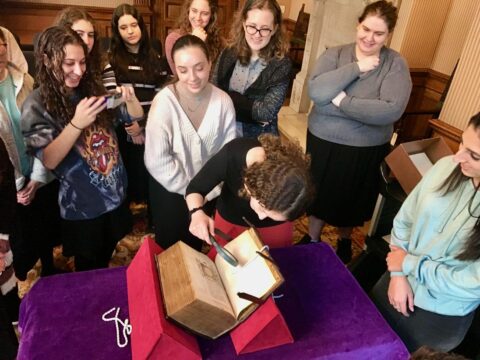 Yeshiva University Students Examine the Artistic Legacy of Solomon's Wisdom.
Yeshiva University Students Examine the Artistic Legacy of Solomon's Wisdom.During the Fall 2022 semester, students from the Zahava and Moshael Straus Center for Torah and Western Thought course "The Wisdom of Solomon: Love, Learning, Leadership" at Yeshiva University's Stern College for Women visited the Pierpont Morgan Library & Museum in Manhattan to see just how far and wide Solomon's sapiential legacy has spread in print. The visit was coordinated by Straus Center Resident Scholar Dr. Shaina Trapedo, who taught the course, and was facilitated by Joshua O'Driscoll, assistant curator of Medieval and Renaissance manuscripts at the Morgan.
In Solomon's lifetime, the East was famed for its intellectual achievements, with Egypt as its epicenter. Having studied 1 Kings, which recounts "Solomon's wisdom was greater than the wisdom of all the Kedemites and than all the wisdom of the Egyptians," it was fascinating for students to see a Coptic translation of 1, 2 Samuel from the 9th century CE found in a monastery in Egypt, as well as an 11th-century homiletic fragment from the same region discussing a verse from Solomon's Proverbs (8:22).
Several illuminated Bibles in Latin, French and English were also viewed, including an exceptionally rare illuminated Hebrew Bible in its original 15th-century goatskin binding. With the aid of a magnifying glass, students were able to read the name of the scribe, Simon ben Rabbi Samuel (Astruc Samiel d'Ascola), who signed his name and dated the manuscript completed in 1422 in Provence, France. In examining the miniatures that adorned many manuscripts, students were struck by anachronistic artistic choices, such as classical architecture and ruins in the background of the scenes portraying Solomon's judgment of the two women at his palace (1 Kings 3) and the Queen of Sheba's visit to Jerusalem (1 Kings 10). In addition to seeing the use of precious materials to highlight the importance of the text, students learned about the role of art in devotional and liturgical works. Artists often overlooked historical accuracy in favor of contemporary dress and neoclassical settings as means to make the stories of the bible feel more immediate for their intended audiences.
From Egypt to Ethiopia and beyond, foreign royals, dignitaries and sages received Solomon's diplomatic hospitality and even studied with the Israelite king. As scholars have argued, over the successive centuries, "Solomonic Enlightenment" seeped out into the world, and the transmission of ideas from East to West led to the "barely conscious memory of the submerged origins of ideas and wisdom practices" (Gerhard von Rad, "The Beginnings of Historical Writings in Ancient Israel," 1944).
Throughout the semester, students studied the three biblical works attributed to Solomon: Song of Songs, Proverbs and Ecclesiastes. At the conclusion of the course, Sydney Hoffman (SCW '25) reflected, "In Shlomo's writings, women are very complex, and often wisdom is personified as a woman. 'Happy is the man who finds wisdom… she is more precious than rubies; all of your goods cannot equal her' (Proverbs 3:13-15). In Hebrew, "wisdom" (chokhma) is a feminine noun, and this cannot be ignored. The wisdom which is portrayed as a woman seems to be attainable, accessible and public."
One of the most renowned episodes from the reign of Solomon is the Queen of Sheba's visit recounted in 1 Kings 10. The session at the Morgan concluded with viewing an Ethiopian account of the royals' meeting entitled Glory of Kings from the mid-20th century. Earlier in the semester, Rabbi Meir Soloveichik, director of the Straus Center, delivered a guest lecture previewing his reading of Solomon's encounter with Sheba, which is now available on his podcast available here.
"The Queen of Sheba is one of the few women in the writings of Solomon who was named," shared Esther Conway (SCW '24). "As Rabbi Soloveitchik said, the Queen of Sheba was a missed opportunity, the opportunity for a relationship with an equal he could work together with." Students were struck to see this relationship artistically imagined in the Ethiopian manuscript.
"It's impossible to track exactly how far and wide Solomon's wisdom has been carried across epochs, from Egyptian princesses to Renaissance poets to US Presidents," Dr. Trapedo said, "but we're so grateful for the opportunity to sample his literary legacy up close in our effort to understand the enduring drive to emulate his good governance and find inspiration in his social and moral vision."
You can learn more about the Straus Center by signing up for our newsletter here. Be sure to also like us on Facebook, follow us on Twitter and Instagram and connect with us on LinkedIn.
